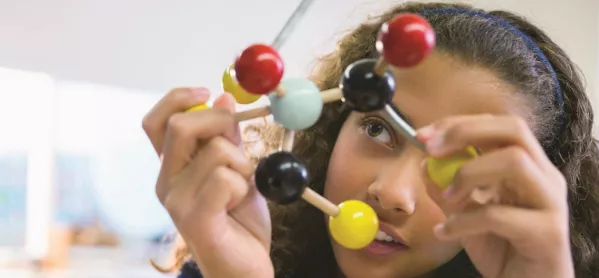The number of girls passing Higher physics and computing has fallen dramatically in just four years, a new report has shown.
The figures state that female Higher physics passes declined from 2,262 in 2014 to 1,863 last year, a total of 399 fewer passes and a drop of roughly 18 per cent.
Higher computing passes have fallen by a similar proportion to physics, from 670 female passes in 2014 to 552 last year.
The data, derived from the Scottish Qualifications Authority, is contained in the first annual report on the government’s science, technology, engineering and maths (Stem) strategy, which aims to “grow Scotland’s expertise” in these disciplines.
The stem gender divide: ‘No real progress made’
Advice for teachers: ’Treat sexist language like racism’
Teacher recruitment: Are we getting the Stem teachers we need?
The decline in uptake comes despite efforts in recent years to encourage girls to pursue Stem subjects.
The statistics are one of the measures the government intends to use to track its progress in encouraging greater enthusiasm for Stem, as well as in tackling the gender imbalance in some subjects.
Physics and computing science were chosen because these were the “school Stem subjects which see the greatest gender imbalance”, according to the report. However, a Tes Scotland analysis of uptake of Stem subjects at Higher found that engineering science was the Stem subject in which the largest majority of candidates - 92 per cent in 2017 - were male.
By 2022, the aspiration is that the number of girls passing physics will have increased by 15 per cent and computing by 20 per cent.
The starting point for measuring progress was the 2017 exam results, but there was no improvement in the number of girls passing Higher physics between 2017 and last year. In fact, the number of female passes declined slightly, from 1,899 to 1,863 in 2018.
In Higher computing science, however, the figures did improve, with the number of girls passing increasing from 480 in 2017 to 552 in 2018.
The other statistics that will be used to monitor progress include: the number of National 5 maths passes; Stem professional-learning hours for educators; deprived pupils leaving school with at least one Stem Higher (or equivalent); the proportion of young people who say they feel studying Stem is important; and Stem student-teacher recruitment.
The government figures showed that intake for Stem secondary teacher-training courses increased from 380 in 2015-16 to 530 in 2017-18. However, figures published last year showed that places on Stem teacher-education courses were still going unfilled.




